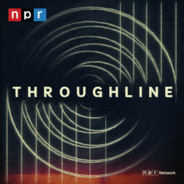
Kultur & Gesellschaft
Throughline Folgen
Throughline is a time machine. Each episode, we travel beyond the headlines to answer the question, "How did we get here?" We use sound and stories to bring history to life and put you into the middle of it. From ancient civilizations to forgotten figures, we take you directly to the moments that shaped our world. Throughline is hosted by Peabody Award-winning journalists Rund Abdelfatah and Ramtin Arablouei.Subscribe to Throughline+. You'll be supporting the history-reframing, perspective-shifting, time-warping stories you can't get enough of - and you'll unlock access bonus episodes and sponsor-free listening. Learn more at plus.npr.org/throughline
Folgen von Throughline
-
Folge vom 20.07.2023All Wars Are Fought Twice (2022)"All wars are fought twice, the first time on the battlefield, the second time in memory," writes Pulitzer Prize-winning author Viet Thanh Nguyen. This week on Throughline, we want to pause the news cycle to think about not just how war is experienced or consumed, but how it's remembered. A refugee from the Vietnam War, Nguyen calls himself a scholar of memory — someone who studies how we remember events of the past, both as people and as nations. As the war in Ukraine continues and conflicts around the globe displace millions, we speak with Nguyen about national memory, selective forgetting, and the refugee stories that might ultimately help us move forward.Learn more about sponsor message choices: podcastchoices.com/adchoicesNPR Privacy Policy
-
Folge vom 13.07.2023No Bad Ideas?Humans have always created. But historian Samuel W. Franklin argues that "creativity" didn't become a social value until the Cold War. Today, we're at another inflection point for humanity, technology, and national identity. The meaning of originality is blurring; there are legal disputes about what constitutes original art; and AI can write a song like your favorite artist in seconds. So what does it mean to put creativity on a pedestal? And what would it look like to tear it down? On this episode, we talk with Franklin, author of "The Cult of Creativity: A Surprisingly Recent History," about original thinking, AI, and how the human drive to create gets branded, packaged, and sold.Learn more about sponsor message choices: podcastchoices.com/adchoicesNPR Privacy Policy
-
Folge vom 06.07.2023The Legacy of Henry KissingerDepending on where you stand, Henry Kissinger is either a foreign policy mastermind or a war criminal. Some see him as a brilliant strategist who made tough but necessary decisions to advance American interests in a complex world; others point to his infamous order that American warplanes should "bomb anything that flies, on anything that moves" as evidence that he bears responsibility for the loss of countless civilian lives. But one thing both sides agree on is that few figures in the 20th century have had a more profound influence on how the U.S. conducts foreign policy.Kissinger grew up in an orthodox Jewish household in Germany, under the shadow of the Nazis' rise to power; he and his family fled to the U.S. when he was a teenager. Professor Jeremi Suri, author of "Henry Kissinger and the American Century," argues that Kissinger's experiences during the Holocaust have informed his approach to global politics throughout his career, as well as his relationship with democracy, war, and power. Today on the show, how Henry Kissinger shaped, and was shaped by, the 20th century.Learn more about sponsor message choices: podcastchoices.com/adchoicesNPR Privacy Policy
-
Folge vom 29.06.2023After Roe: A New Battlefield (2022)The Supreme Court's decision in Roe v. Wade transformed the landscape of abortion rights overnight. For the doctors, lawyers, feminists, and others who had fought for nationwide legalization, Roe was the end of a long battle. But for the growing movement against abortion rights, it was the beginning of a new battle: to protect the fetus, challenge abortion providers, and ultimately overturn Roe. This is the story of how opponents of abortion rights banded together, built power, and launched one of the most successful grassroots campaigns of the past century.Learn more about sponsor message choices: podcastchoices.com/adchoicesNPR Privacy Policy
